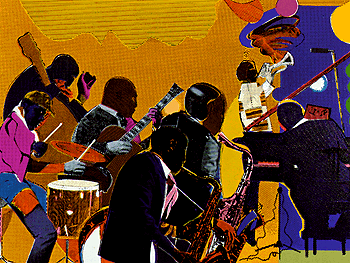Romare Bearden was born on September 2, 1911 in Charlotte, North Carolina, and his family moved to Harlem three years later. His mother was New York editor for the Chicago Defender, a position which introduced her to leading figures of the Harlem Renaissance. Bearden spent summers in North Carolina and graduated from Peabody High School in Pittsburgh while living with his grandparents.
He then attended New York University, graduating in 1935 with a degree in education. He began his art career during college with cartoons published in the campus magazine and national publications such as Colliers and The Saturday Evening Post. After graduation he studied at the art Students League under George Grosz, primarily painting scenes of the American south. He also began working for the New York City Department of Social Services as a caseworker for the gypsy population, a position he held until 1969.
 |
| Morning |
Although working in a variety of mediums he is best know for his collages, one of which was on the cover of Time in 1968, and Encyclopedia Britannica refers to him as "the preeminent collagist in the U.S." Many of his public murals are based on his collages, such as the 10' by 16' Berkeley - The City and Its People in the Berkeley, California, City Hall, and Pittsburgh Recollections at the Gateway subway station in Pittsburgh, which is valued at $15 million. Bearden also did book illustrations and set designs for the Alvin Ailey Dance Company in Harlem. He wrote three books on African American art, and published numerous essays and reviews. In the early 1950's he was a songwriter, with his Sea Breeze being recorded by Billy Eckstine and Dizzy Gillespie. In 2003 Branford Marsalis recorded a CD of his songs. There is much musical imagery in Bearden's work, and his Harlem studio was above the Apollo Theater.
Bearden died in New York City on March 12, 1988 at the age of 76. The Romare Bearden Foundation was established two years later to preserve his legacy and to support young artists.
"I think the artist has to be something like a whale, swimming with his mouth wide open, absorbing everything until he has what he really needs. When he finds that, he can start to make limitations. And then he really begins to grow." ~ Romare Bearden













